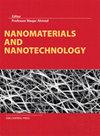barbatus叶提取物介导的ZnS和mg掺杂ZnS NPs的合成:结构、光学、形态和抗菌研究
IF 3.3
3区 材料科学
Q2 MATERIALS SCIENCE, MULTIDISCIPLINARY
引用次数: 1
摘要
在目前的研究中,研究人员探索了掺杂的镁离子对硫化锌(ZnS)纳米颗粒(NP)的光学、形态和结构性能的影响。采用绿色技术,以半枝莲叶提取物为封端剂,制备了纯的、2%和5%镁掺杂的ZnS纳米颗粒。采用XRD、SEM、FTIR、紫外-可见光谱等方法进行了研究。XRD结果表明,合成的材料均为立方结构,空间群为F-43m。Dav几乎在2.02–2.20之间 nm。SEM图像表明纳米颗粒是团聚的。紫外-可见光结果表明,随着Mg2+离子的增加,光学带隙增加,其范围为3.81–4.42 所制备的NP的吸收肩随着掺杂剂浓度的增加而蓝移。FTIR光谱给出了Zn-S键的特征峰,并断言了NP的形成。对大肠杆菌和金黄色葡萄球菌菌株的抗菌检查显示,纯和Mg掺杂的ZnS NP对这两种菌株都具有更高的活性。结果表明,所制备的材料可用于抗菌活性和光电应用。本文章由计算机程序翻译,如有差异,请以英文原文为准。
Plectranthus barbatus Leaf Extract-Mediated Synthesis of ZnS and Mg-Doped ZnS NPs: Structural, Optical, Morphological, and Antibacterial Studies
In the current study, the researchers have explored the influence of doped Mg ions on the optical, morphological, and structural properties of zinc sulfide (ZnS) nanoparticles (NPs). The green technique was employed to prepare pure and 2% and 5% Mg-doped ZnS NPs using the Plectranthus barbatus leaf extract as a capping agent. XRD, SEM, FTIR, and UV-visible were used in the investigation process. The XRD results showed that all the synthesized materials have a cubic structure with space group F-43m. The Dav was nearly in the range of 2.02–2.20 nm. The SEM images illustrated that NPs were agglomerated. The UV-visible results showed that the optical bandgap increased as Mg2+ ions increased, which was in the range of 3.81–4.42 eV. The absorption shoulder of the prepared NPs is blue-shifted with increasing dopant concentration. The FTIR spectrum gives characteristic peaks for Zn-S bonds and asserts NPs’ formation. The antibacterial check against E. coli and S. aureus bacterial strains revealed that pure and Mg-doped ZnS NPs have higher activity for both bacterial strains. The results have shown that the prepared materials can be used for antibacterial activities and optoelectronic applications.
求助全文
通过发布文献求助,成功后即可免费获取论文全文。
去求助
来源期刊

Nanomaterials and Nanotechnology
NANOSCIENCE & NANOTECHNOLOGY-MATERIALS SCIENCE, MULTIDISCIPLINARY
CiteScore
7.20
自引率
21.60%
发文量
13
审稿时长
15 weeks
期刊介绍:
Nanomaterials and Nanotechnology is a JCR ranked, peer-reviewed open access journal addressed to a cross-disciplinary readership including scientists, researchers and professionals in both academia and industry with an interest in nanoscience and nanotechnology. The scope comprises (but is not limited to) the fundamental aspects and applications of nanoscience and nanotechnology
 求助内容:
求助内容: 应助结果提醒方式:
应助结果提醒方式:


